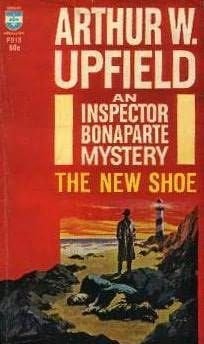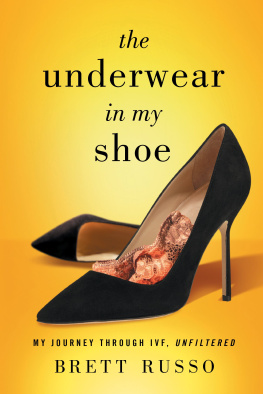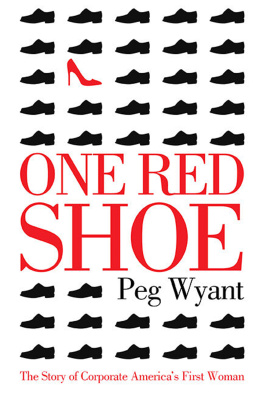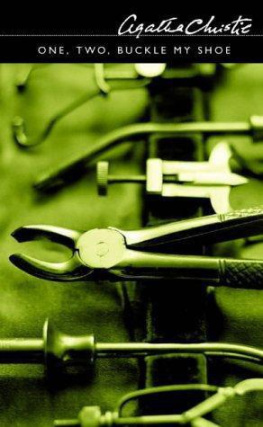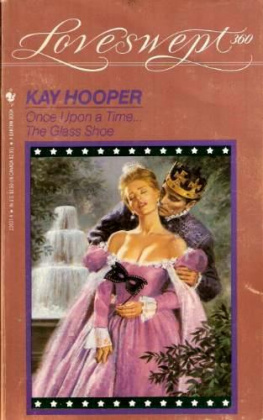Minda Danner - The Shoe Guy
Here you can read online Minda Danner - The Shoe Guy full text of the book (entire story) in english for free. Download pdf and epub, get meaning, cover and reviews about this ebook. year: 2017, publisher: Christian Faith Publishing, Inc., genre: Detective and thriller. Description of the work, (preface) as well as reviews are available. Best literature library LitArk.com created for fans of good reading and offers a wide selection of genres:
Romance novel
Science fiction
Adventure
Detective
Science
History
Home and family
Prose
Art
Politics
Computer
Non-fiction
Religion
Business
Children
Humor
Choose a favorite category and find really read worthwhile books. Enjoy immersion in the world of imagination, feel the emotions of the characters or learn something new for yourself, make an fascinating discovery.

- Book:The Shoe Guy
- Author:
- Publisher:Christian Faith Publishing, Inc.
- Genre:
- Year:2017
- Rating:3 / 5
- Favourites:Add to favourites
- Your mark:
- 60
- 1
- 2
- 3
- 4
- 5
The Shoe Guy: summary, description and annotation
We offer to read an annotation, description, summary or preface (depends on what the author of the book "The Shoe Guy" wrote himself). If you haven't found the necessary information about the book — write in the comments, we will try to find it.
The Shoe Guy — read online for free the complete book (whole text) full work
Below is the text of the book, divided by pages. System saving the place of the last page read, allows you to conveniently read the book "The Shoe Guy" online for free, without having to search again every time where you left off. Put a bookmark, and you can go to the page where you finished reading at any time.
Font size:
Interval:
Bookmark:

Introduction
The known family history begins in 1905 when Roberts grandfather came from Germany to the United States. Roberts father was Wert Bauer who married Bertha Lee. From that union first came in 1914 a boy named Lee Bauer. Their daughter, Edith, was born in 1916. The change of life baby, Robert Edward Bauer, was born September 18, 1930 in Decatur, Illinois.
Chapter 1
Decatur
Robert (Bob) was born in the heart of the Depression. It could be said he was an accident because his mother was in her forties, and the last thing they needed was a baby. Bobs father came from a very large family who were basically farmers. His father had eleven brothers and one sister. All of Bobs fathers siblings stayed in the business of farming even though it was difficult to make a profit especially at that time in our history. But Bobs father decided to go to the city for a job at a factory in order to better support his family. He became an iron molder which is a very labor intensive job.
Bobs brother who was fifteen years older than Bob and his sister who was thirteen years older than Bob were more like aunt and uncle, while his parents were more like grandparents. However, his maternal grandmother told his mother that Bob should be helped getting involved in music so when he was six years old, she gave him piano lessons. It was an old upright piano, but it had a good tone. Then, at age nine, Bob decided that he would like to play the trumpet, and his mother bought him a trumpet and started him taking lessons with a trumpet teacher, Mr. Rawley. At that time they lived in the country by Lake Decatur, and his mother had to arrange transportation into the city to get his lesson. His father was now working on Saturdays because of the increasing importance of his job, and Bob would ride with him into the city to get his lesson, wait for his father or hitchhike home in the afternoon. At that time all the movies had matinees starting at 11:00 a.m. His mother would give him an extra nickel (price of admission) until time to meet his father to go home. She also included eight cents for lunchpopcorn and a coke drink which Bob enjoyed very much! One Saturday morning he went to get his lesson, and Mr. Rawley was sick, so Bob walked around town to wait for the movies to start. Remember he was nine years old and learned early how to get around the city. It began a very enjoyable activity for Bob. So the next time for his lesson he called Mr. Rawley and told him he wouldnt be in for his lesson. He walked around, had again (with his lesson money) a hamburger and milkshake lunch waiting for the movie to start. It began a habit, and every Saturday it became his activity. Then after a few weeks at supper time his mother asked him how his trumpet lessons were coming along. He told her, Fine. She said, Thats strange because Mr. Rawley called to say you havent been to a lesson in several weeks. Bob got her message. Nothing else was said, but Bob never missed another trumpet lesson. Even at his young age Bob had a great deal of freedom and was able to spend much time enjoying the parks and music in general as there were stores where he could listen to records free of charge. Somehow he never got into trouble. He knew right from wrong and never wanted to disappoint his mother. He was, however, a little mischievous. His sister saved her money and for his birthday bought him a beautiful blue bicycle. He preferred to have a red one and without the knowledge of the family got red paint and painted his new bike red which ruined it! That made his sister VERY unhappy. Bob remembered in 1941 sitting by the radio hearing Japan had bombed Pearl Harbor, and the country was in a war. His brother joined the Navy and ran a ship repair unit in New Guinea. Everything was rationed. All of them learned to walk everywhere because gasoline was in such a short supply. He also recalled vividly the end of the war. There were parades, much celebrating where everyone was hugging, laughing, and very happy. Bob took his bike and rode around, amazed at all the celebrations. He seemed to look at everyone and everything with new eyes at age fifteen as he recaptured those moments.
Young Robert (Bob) started school in the Decatur Elementary Garfield Grade School in the first grade through grade six. It was in first grade where he was switched as a leftie to using his right hand. He progressed seventh through ninth grades at Decaturs Roosevelt Junior High School and then to Decatur High School to graduate with his senior class. Because Bob took piano lessons from the time he was six until age eight and then, he took up the trumpet, when attending Junior High School he played the trumpet at the raising of the flag in the morning and the lowering of the flag at the end of the school day in the afternoon. One day he played hookey from school to see the movie downtown, Frankenstein meets Wolfman . After the movie he went back to play for the lowering of the flag only to find the school empty. Bob was surprised to find the principal waiting for him. Bob asked him, Where is everybody? The principal said, President Roosevelt died, and school was dismissed. Where have you been? For that Bob got suspended for two weeks. When he got back to school and played in the band he was switched from trumpet to baritone horn due to the surplus of trumpet players.
A brief encounter with the world of manual labor for pay happened in his early teens. He, with other youngsters, was hired to pick up in the field the ears of corn the mechanical picker had missed. He would be paid twenty-five cents for a full gunny sack. It was very hard work, and it was a brief job.
Later, Bob entered his food career with the owners of Toms Grill who assumed he was sixteen, but he was still fifteen. His title was Dishwasher. Pete and Pauls Eureka Cafe was his next food employment experience as a waiter. The owners were from Greece, brothers, and strangely NEVER spoke to each other. He was allowed to take counter orders and proved to be reliable enough to man the grill with the cooks hat to wear. The brothers differed on political party preference. When the presidential election was coming they bet the full ownership of their restaurant. Which brother won would have the restaurant, the other would relinquish his half of the ownership and leave. Despite the first newspaper headlines Dewey didnt winHarry Truman did. Finally the one brother bought out the other, and Bob continued to work for the current owner while he was fifteen. He was allowed to eat as much as he wanted. That lasted only two weeks because he became tired of the same food every day. However, there was no objection for him to take home a bag of food to his parents. Of course, being in the view of other teens at Toms Grill and Pete and Pauls Cafe gained him recognition in addition to his playing in the school band. He managed to squeeze in some dates. The schools prettiest girl was his first date. He had some difficulty in figuring out the thinking of girls, though. He was very respectful on his first date only to learn she was disappointed that he didnt make ANY advances. The next girl was insulted because he DID try to get fresh. Poor Bob was very confused!
Bob remembered the Victory Garden and the general patriotic attitude of the community as well as the whole country. He was influenced by his mother who taught him to always take something when going to the doctors office. Because of their garden, he remembered it was mostly some kind of produce.
Bob was around nine years old when he began playing the trumpet. Again his mother, who regularly took him to church, encouraged him to be a solo player there in front of the congregation. He recalled the hymn he always played was Abide with Me . While in high school music became a major interest, and he played the baritone horn in the school band. Rex Reese, the band director became a strong influence to Bob as well as the other boys. Mr. Reese was a mentor and a father figure to them. The all boy band members became known as the Red Coats. The group had many famous alumni as Dean Kinkade who was the head arranger for Tommy Dorsey. There may have been some school classes missed but NEVER the band practice. An introduction to a live jazz performance was probably when Sarah Vaughn was featured at a high school event. Another teacher in high school was a memorable influence in teenage Bobs life. She was the World History teacher. At the beginning of the school year when he was a senior, she stated she had never while teaching the subject failed a student. Bob apparently took that as a challenge (rather than she would do everything to help a student pass the course). He deliberately made no attempt to get good grades in her class, and she had no choice but to fail him. When called to a conference to face him with the prospect of not even graduating due to her failing him, she was in tears. Bob was deeply moved and felt quite guilty and that teacher through that became the source of teaching him humility. He took an additional accelerated class to pass World History. So he did graduate with his class.
Font size:
Interval:
Bookmark:
Similar books «The Shoe Guy»
Look at similar books to The Shoe Guy. We have selected literature similar in name and meaning in the hope of providing readers with more options to find new, interesting, not yet read works.
Discussion, reviews of the book The Shoe Guy and just readers' own opinions. Leave your comments, write what you think about the work, its meaning or the main characters. Specify what exactly you liked and what you didn't like, and why you think so.

